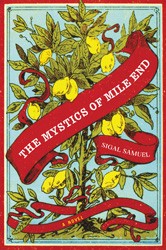Recently named Opinion Editor at the Forward, Sigal Samuel is the author of The Mystics of Mile End, a novel bending standard concepts of community, gender, and Jewish mysticism. She is blogging here all week as part of the Visiting Scribe series on The ProsenPeople.
 Image from An Illumination of Blessings by Ilene Winn Lederer
Image from An Illumination of Blessings by Ilene Winn Lederer
To study Kabbalah, you’re supposed to be (a) forty years old, (b) married, and © a man. I am none of these things. Luckily, I grew up with a dad who was a professor of Jewish mysticism and was willing to share its secrets with me.
Raised in Montreal’s Orthodox community, I attended a school with strict gender norms. I was expected to obey all of Judaism’s 613 commandments. But, as a girl, I wasn’t allowed to take an interest in the religion’s more esoteric branches.
That didn’t stop my dad from giving me lessons in mysticism. His after-school classes, which usually took place around our dining room table, began when I was about twelve and continued throughout my high school years.
I loved these Kabbalah lessons. What I didn’t love was the way Kabbalah seemed to replicate the gender norms I was trying to escape. It wasn’t just that women were not supposed to be studying the medieval mystical texts; the texts themselves included some pretty sexist ideas about women.
I remember the day my dad introduced me to the Kabbalah’s Tree of Life — the ten divine vessels that gave rise to the entire physical world. He explained that, according to the Kabbalists, some vessels are male and some are female. The male ones emit divine light, while the female ones only receive it. I protested, stamped my foot, felt insulted and cheated and angry.
That feeling was still with me when, years later, I sat down to write The Mystics of Mile End, my novel about a dysfunctional Jewish family obsessed with climbing the Tree of Life as a way to become one with God. Although I had a lot of love for the Kabbalistic texts, I knew that I wanted to question and subvert their gender norms. Plus, from a writer’s perspective, I almost had no choice but to do that: How could I show a hyper-educated, contemporary, urban Montreal family engaging with Kabbalah and not have at least one of them grapple with its sexism? In our postmodern world, that wouldn’t be believable.
 All of this might go some way toward explaining why, in my novel, the most successful Kabbalist is not David, the family patriarch who also happens to be a professor of Jewish mysticism, but his daughter Samara. She doesn’t fit the profile of a Kabbalist at all, especially since (a) she’s a young college student, (b) she’s not married but in a relationship with another woman, and © she is, of course, female.
All of this might go some way toward explaining why, in my novel, the most successful Kabbalist is not David, the family patriarch who also happens to be a professor of Jewish mysticism, but his daughter Samara. She doesn’t fit the profile of a Kabbalist at all, especially since (a) she’s a young college student, (b) she’s not married but in a relationship with another woman, and © she is, of course, female.
In addition to pushing back against the Kabbalists’ sexism (including the idea that men are active and women are passive), Samara develops some pretty… unorthodox methods of climbing the Tree of Life. Let’s just say it involves club-hopping, binge-drinking, and giving blowjobs in dark alleys.
At this point, a medieval mystic might object that those aren’t, ahem, bona fide ways of becoming one with God. But it’s the twenty-first century, and if we really want to imagine what a mystical attempt would look like nowadays, we’ve got to be willing to do some gender-bending and genre-bending — ideally both at once.
Sigal Samuel is an award-winning fiction writer, journalist, essayist, and playwright. Originally from Montreal, Sigal now lives and writes in Brooklyn. The Mystics of Mile End is her first novel.
Related Content:
- Eric Weiner: The Perils and Pleasures of Spiritual Travel
- Michael Golding: A Sacred Space
- Rachel Cantor: The Power of the Aleph
Sigal Samuel is a Staff Writer for Vox’s “Future Perfect.” She writes about artificial intelligence, neuroscience, ethics, and the intersection of technology and religion. Previously, she was the Religion Editor at The Atlantic. Her award-winning journalism has also been published in outlets like BuzzFeed, The Daily Beast, The Rumpus, and Electric Literature. She has appeared on NPR, BBC, and CBC. Sigal’s novel, The Mystics of Mile End, tells the story of a dysfunctional family dealing with mysticism, madness, and mathematics in Montreal. It was nominated for the International Dublin Literary Award and won a Canadian Jewish Literary Award. Sigal earned her MFA in Creative Writing from the University of British Columbia and her BA in Philosophy from McGill University.


